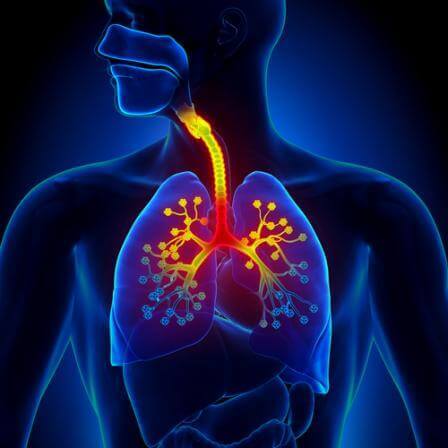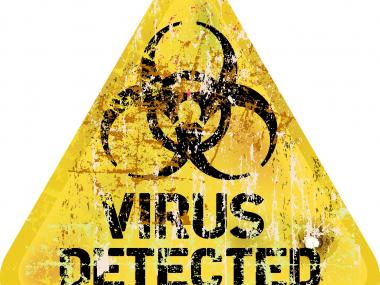What Is Acute Bronchitis?
Acute Bronchitis is often erroneously treated with antibiotics when it is typically caused by a virus. Learn what it is and how you can best treat it.
If you’ve been following the news in the recent 1-2 months, you’ve learned that the flu season has spiked much later than usual this year. The cold and flu viruses are, in fact, rampant at the moment in March. These nasty viruses can make you feel quite ill—as much if not more, than a bacterial illness.
On the House Call Doctor podcast, one of my missions is to shed light on medical myths. With unreliable medical information on the Internet, it’s important to delineate fact from fiction when it comes to your health.
So today, I’d like to focus on one of the greatest myths of the cold and flu season: acute bronchitis. If I only had a dollar for every time I encounter a request for antibiotics for an “acute bronchitis” diagnosis, I could likely give up my day job …
So let’s understand what acute bronchitis really is, and how it can be treated.
What Is Acute Bronchitis?
If you listen to my podcast regularly, you know that anything that ends in “-itis” refers to inflammation. And “bronch” refers to the “bronchi,” large tubes that carry oxygen in the upper regions of the lungs. Therefore, “bronchitis” simply means inflammation of these upper airway bronchi.
The word “acute” distinguishes it from “chronic bronchitis,” a separate medical condition that is often experienced by smokers with Chronic Obstructive Pulmonary Disease (COPD), causing inflammation of these bronchi on a daily and chronic basis. Not fun.
Against popular belief, acute bronchitis is actually caused by viruses, not bacteria. The common cold or flu virus is notorious for causing inflammation of these bronchi.
Symptoms of Acute Bronchitis
Those with acute bronchitis often catch the common cold or flu virus initially. I’ve discussed these two bugs in great detail previously, along with how to determine the difference between the two if you wish to learn more. Those with acute bronchitis often report the following nasty viral symptoms.
Cough: In patients with acute bronchitis, when the typical cold or flu symptoms abate (typically within 7-10 days), the cough tends to persist. In fact, it can persist for up to three weeks or more.
Wheezing: In addition, because the upper airways are inflamed, it can also cause wheezing. This happens as air flows through these tubes with an inflamed and thickened lining, and makes a whistling noise as you exhale. Asthmatics also often wheeze, so if you suffer from asthma, it’s important to distinguish this from an asthma flare up.
Mucus: In addition, it’s very common for those with acute bronchitis to complain of coughing up phlegm or mucus that can be clear, white, yellow, or green. Another common myth busted: green phlegm does not reflect a bacterial infection. After all, what color are boogers?
Now that you know a little more about the symptoms, let’s find out how to treat acute bronchitis …
Treatment of Acute Bronchitis
We treat acute bronchitis similarly to the cold and flu. There is no cure for acute bronchitis, and antibiotics are NOT effective. Antibiotics only treat bacteria, and therefore don’t do a thing for acute bronchitis patients; they can, in fact, be harmful. Besides causing unwanted side effects (such as diarrhea and infections in the colon), it causes resistance so that when you really need it to work one day, it will not be effective—this is a scary thought for most of us physicians.
Even if you do nothing, the cough and symptoms will resolve on their own. But here are a few tricks that may provide some symptomatic relief:
Cough suppressants: Over-the-counter cough syrups, or prescription cough suppressants, can help take that edge off so that you can at least function during those seemingly endless coughing attacks and catch some z’s and/or rest. They are by no means a cure, and coughing is a mechanism your body uses to remove what doesn’t belong there. It is not necessarily a bad thing to cough, albeit potentially uncomfortable and distressing.
Cough Drops: Although temporary, a bag of sugar-free lozenges can be your best friend during an acute bronchitis attack.
Inhalers: If you find yourself wheezing, it’s vital to get checked out by your doctor—because occasionally, patients with pneumonia can also wheeze. In addition, it’s important for your doctor to make certain your lungs are oxygenating well. If you are wheezing, prescription inhalers may be helpful to help open up those airways.
Steroids: In addition, those who wheeze or have a severe cough, a short course of prescription steroids can help calm down the airways. Not everyone can take steroids, however, so make sure to discuss its side effects with your doctor—especially if you are a diabetic.
A few important distinctions to make between the cough produced by acute bronchitis and that from the following:
Pneumonia: These patients often feel quite ill, and fever is a more common symptom here. These patients can also wheeze. We worry most about the elderly who experience pneumonia, as well as those with lung disease (such as COPD or asthma), and those who have trouble breathing in any way. It can potentially become an emergency for some patients.
Post-nasal drip: What is even more common than acute bronchitis after the common cold is a drip from the nose to the back of the throat. This drip irritates and inflames the throat, and hence, causes a cough. It’s often worse with lying down due to gravity. Patients often can’t help but attempt to “clear their throat” because of this constant drip. It can also cause an intermittent but mild sore throat. Prescription intranasal steroids can help with this post-nasal drip.
Share your ideas and learn more quick and dirty tips with us on the House Call Doctor’s Facebook and Twitter pages! You can even find me on Pinterest!
Please note that all content here is strictly for informational purposes only. This content does not substitute any medical advice, and does not replace any medical judgment or reasoning by your own personal health provider. Please always seek a licensed physician in your area regarding all health related questions and issues.
Image courtesy of Shutterstock.https://shutterstock.com







